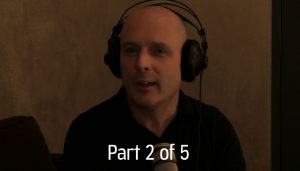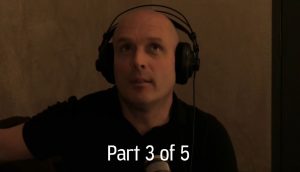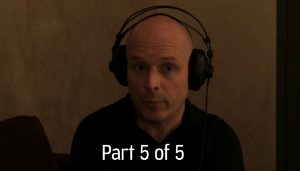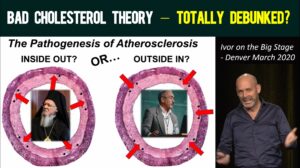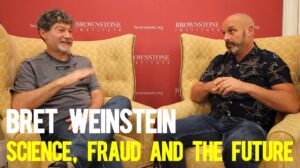Before enjoying this podcast, please help by subscribing for free right RIGHT HERE and help us to get the message out; it only takes a second – thank you! Also please share as much if possible – the search engines and algorithms are not our friends anymore!
Welcome to Episode 44, featuring a return guest Peter Ballerstedt – expert on forage agronomy and much else relating to livestock. There’s been a lot of discussion of late with regard to livestock and climate impacts – and often the nutrient-density of animal foods is left out of the conversation. Here we have a short 20min chat on some of the key points regarding both, recorded when I caught up with Peter at Keto Salt Lake last April. For those interested in the arena, there are good published papers HERE and HERE which cover the controversy.
FULL TRANSCRIPTION BELOW (link to PDF at bottom of this post):
Ivor Cummins 00:24 Hey guys, Ivor here aka The Fat Emperor. So we’re bringing you another free podcast. And we keep these podcasts free by being funded by the Irish Heart Disease Awareness organization. So if we could ask a quick favor, if you could go to ihda.ie, scroll down the homepage and help us share out the website and all this resources to people around the world. There’s so many people out there who are middle risk and have no idea that they’ve got catastrophic heart disease inside. With the right information, they can find out their level of disease, get the right treatment, change their lifestyle and prevent future heart attack. Thanks, guys
01:05 I’m here at Keto Salt Lake City, and great conference great speakers. And I’ve just had the pleasure of meeting again,Peter Balledstadt.
Peter Balledstadt 01:14 Good to see you again. Ivor.
Ivor 01:15 Yeah, great stuff. And I got some of your talk there, though with other interviews going on. But you are talking about sustainability generally and the impacts of human health relating to agriculture and ruminants in the animal food supply.
Peter 01:31 Yes. So I’m trying to address the lack of the ketogenic or low carb perspective on nutrition and its potential impact on chronic disease that currently isn’t included in conversations about sustainability.
Ivor 01:50 And the current conversations, they’re quite simplistic. It’s that animals are bad for the planet and global warming and whatever, and that meat may cause disease, which is kind of surprising for an evolutionary human food that got us to where we are. But there you go. So the keto doesn’t have to be a meat or animal products, heavy diet, you can do plant based keto, but you really were tackling mostly some of the mythology around how animals affect the global climate and indeed how animals might be bad for human health.
Peter 02:24 Yes, precisely. For people who choose to eat animal products, and especially red meat from ruminants (sheep, goats, beef, venison) there’s a number of animals and products people would be familiar with, as opposed to poultry or swine. They are being targeted in the conversation about environmental impact, because of methane that is generated as a result of the unique rumen fermentation process, the way that ruminant animals can digest a high fiber diet. So I just wanted people to have some other pieces of information that could contradict some of the common perceptions.
Ivor 03:09 One fact that was brought up and I haven’t researched this myself, but we’ve had a global warming or climate change problem for around 150 years, you could say it’s growing, and we see the graphs of CO2, etc. And they go back to the start of the Industrial Revolution, when we started using coal and fossil fuels and all that activity started, which makes sense. But I’ve heard that there were far more grazing animals and bison hundreds and thousands of years ago, and there was no change in any CO2 or no problem. Does that not indicate that the animals are only a small part of the problem, if anything?
Peter 03:48 Well, indeed. And so some of the figures that I shared today, based on EPA values, which is where they come from, that all of agriculture in the United States is 9% of US greenhouse gas emissions. Nine. 9.0. Livestock agriculture is 4%. Just four, so less than half, and 2% is coming from beef. And that’s against the 28 some percent for transportation.
Ivor 04:24 Yeah, so the orders of magnitude essentially difference. So the overwhelming proportion of any of our climate issues are not actually to do with the ruminants at all essentially.
Peter 04:36 That’s where the data leads me. And one aspect I didn’t talk about is that when we’re talking about methane that comes from ruminant animals, we’re talking about cycling CO2. So the CO2 came from the atmosphere via photosynthesis into the grass the cow eats, and then as she digest that grass, some of that fixed CO2 gets emitted as methane. But then methane within about 10 years, gets oxidized back to CO2. So it’s a cycling of CO2, versus when we burn fossil fuels, which represents an enrichment of the atmosphere with CO2 that didn’t exist previously.
Ivor 05:17 So even the small percentage of emissions relating to ruminant animals, you could argue, becomes even vanishingly smaller if you consider that cycle.
Peter 05:27 Indeed. And then a subsequent piece that’s being researched more and more now, is that under proper management of grazing animals on grass, we see increases in soil organic matter, which means that we’re putting more Co2 equivalents. This organic matter is another form of fixed CO2 into the soil. Now, there’s a turnover to that, different pools of it. But if we can increase that, then there’s lots of environmental benefits that occur as well.
Ivor 06:01 Right. So if anyone was going to criticize anything about the animals, or animal foods, maybe criticize the mass factory, green fed animals, if you want to criticize this vector at all, but certainly not well managed, you know, pastured animals eating off grass and part of the natural cycle millions of years.
Peter 06:23 Well, and indeed, we even in the United States need to take a step back, because our production systems are based on pasture. Even though we have the majority of the beef that comes to market is coming through a feedlot finishing phase., but the vast majority of its life is spent on pasture. You know, the mama cow calf, that’s all pasture or range, then the weaned animal can go on to a more productive pasture, higher quality for a period of time, until it gets big enough to then enter into the finishing phase. And even in the finishing phase, they’re still eating forage as part of their diet. So all of this… just as the greenhouse gas story has been simplified. Many of the other stories have been simplified, like for example, saturated fats, since it’s solid at room temperature must clog your arteries.
Ivor 07:23 Similar to that old chestnut. Well, that one was so particularly offensive, so absurd. Yeah, indeed.
07:30 So if we take then the animals, if they were properly, and as you’re saying then, a large proportion of the animal life on average in the US is kind of pretty traditional land and out on the grass. But there’s the finishing that goes on. Perhaps some people might be concerned with processed meat, not just in sausages, but the idea that the animal has a lot of antibiotics, hormones, all those kinds of things, people would perceive as processing, as non natural. You were saying that they may not be quite so bad as people think in terms of the residual hormones in the animal and the effect of the antibiotics that actually remains through to the meat?
Peter 08:15 Well, I guess I’d phrase it a little differently. But I’d start by saying that we have reason to be confident in our food supply and our food system in the United States. In Europe as well, but I know the United States. And in the United States, every antibiotic that’s used has to be used under supervision. There are withholding periods, which are designed to allow sufficient time for all residue or the proper level, to be reduced by the animals metabolism so that when that animal is slaughtered, we don’t have problematic levels within the meat. Every truckload of milk, for example, is tested. If there are residuals of pesticides or antibiotics, that entire load is rejected, and somebody’s going to get a big fine. These sorts of monitoring procedures and processes are in place.
09:12 As far as the specific hormones, we need to realize that everything that’s alive has hormones. Plants have hormones, and certain plants have high enough levels of hormones that are close enough to human hormones to affect the response. And they can be orders of magnitude greater than anything we would be exposed to, from beef, for example, regardless of whether that animal received an exogenous, slow release hormone or didn’t. And in fact, at the end of the day, from similar serving sizes of beef from a steer that received an implant versus one that didn’t, we’re talking one nanogram difference.
Ivor 09:57 Wow! Nanogram. So that’s 10−9. Yeah, one thousand millionth of a gram. Yeah. And the hormones, of course, soy and all kind of illicit a hormonal response. And there are a lot of problematic plant foods as well. So you got to pick your poison at the end of the day.
Peter 10:13 Indeed, indeed. And some of these things actually reduce the environmental footprint of the animal agriculture, the technology that improves efficiency. And so today, the figures are something like 70% less resources necessary to produce beef today than they were in 1970.
Ivor 10:36 Right, which will reduce the relative emissions per animal essentially.
Peter 10:40 Exactly!
Ivor 10:41 And the 4% for the animal farming, out of all of the burden on environment, then you got to reduce that with the cycle that we discussed, and then only a half of it is beef, as well. So you’re right down to tiny, tiny numbers in terms of the percentage of scale of the problem. What about though plant farming to get the same amount of nutrient dense food for a human? It’s not like the plant farming has zero footprint. If the meat one is tiny, what size is the plant one relatively?
Peter 11:16 Well, if livestock agriculture is 4%, and all of agriculture is 9%, then we’ve got 5%, which they’re close, but now we’re talking about having to increase to make up for the lack of the animal products. And we know that protein from animal sources is worth more than protein from plant sources. As we could say the same thing about lipids and minerals and vitamins. And so we’re talking about having to increase more production.
11:50 There was one study that looked at what would happen if we remove livestock agriculture from the United States? They were in the course of their estimate, reducing total greenhouse gas emissions by less than 3%. Because you’d have to…. so there’s a trade off, and worldwide, it was below a point. But it would come at the cost of unbalancing our food security system, as well as creating nutrient deficiencies.
Ivor 12:24 And the 5% for plants then that you mentioned versus 4%, if the 4% for beef and other livestock has an inherent lowering of that 4% because of cycling, where the carbon dioxide in the atmosphere, the plant foods feeding the animal and the fixing into the soil works out well, what about the 5% for the plant foods? Has that got an inherent cycling or not? Is that really 5% and worsening?
Peter 12:53 Yeah, we’re probably looking at a growing problem. Although I don’t think that work has been done. So being conclusive about it is tricky. But we can imagine that most of these crops are annual crops. And most of those annual crops require some amount of soil cultivation. And when you cultivate the soil, you increase the oxidation of the organic matter in the soil. So that Co2 is going to be released. Now that’s cycling, okay, but there’s less now in the soil. And most of those are going to require fossil fuel inputs to a greater degree than livestock agriculture, especially beef industry is going to require. So most of the harvesting and the beef industry is done by the cow.
Ivor 13:37 Yeah. So yeah, you’re going to have a lot more mechanical and industrial elements with the plant food production. Right. So it’s not nearly so or what most people would perceive, we’ve just gone through some of the figures, it’s a very different scenario. What about human health in meat? It has recently been increasing [Inaudible 00:13:55] to talk about meat causing cancer. What are your thoughts on that whole vector?
Peter 14:00 My understanding is, anything that speaks about a negative health impact of red meat consumption is ultimately based on data from Nutritional Epidemiology of Chronic Disease work, which your audience would well understand is extremely problematic. And conversely, we don’t see the evidence of intervention studies that would support those theories. As I said in my presentation, I think the most likely harm associated with meat consumption is from not eating enough when it comes to human health.
Ivor 14:39 And I think the WHO, they sometimes speak out of two sides of their mouth: there’s the meat in cancer from one department based on data, which I agree Peter. To be quite honest, it’s embarrassing when I go through it. It’s embarrassing that even they have publications on this, the data is so weak. But then on the other side, I think they are another world widebody have acknowledged one of the primary causes of malnutrition in the world is a lack of meat, which brings all key nutrients.
Peter 15:07 Yes. And so now you have the tension between Food and Agriculture Organization, and the World Health Organization, as two separate bodies. And absolutely, there’s some wonderful work looking at very achievable interventions with school children, for example, in Kenya and seeing improvements in their academic performance by being able to supplement meat into their diet.
Ivor 15:31 Yeah, because it brings in all of those crucial things like B12 and many other components that you can’t really get elsewhere so well.
Peter 15:39 Precisely.
Ivor 15:40 And an organ meats are an extremely cheap and massively nutrient dense food for humans too. And I think one of the sad things in the modern world is they’ve been devalued and as the generations have gone by, fewer and fewer people are eating them. I was in Dublin, one of my favorite restaurants Ranelagh, in Dublin, it’s “La Bodega”. And they do something, (the very few restaurants do in Dublin now) they do kidneys in heavy cream.
Peter 16:08 Okay.
Ivor 16:09 And they are delicious. Now they’re pungent. You know, kidneys are not for everyone. But every time I go there, I get the kidneys and the little dish of tapaz, and they are gorgeous. And the other thing is, you know, when you’re eating liver and kidneys, well prepared, you are sitting down to a highly nutrient dense beneficial meal. And that gives more pleasure in the eating of it.
Peter 16:29 And that reminds me your mention of that term, “nutrient dense,” people need to be aware that nutrient dense, has an official definition per the Dietary Guidelines. And it is explicitly low fat, because they don’t consider fat, a nutrient. And so they only see fat as diluting the vital phytonutrients. This again speaks to the, we really have this convoluted and confounded conversation. And I hope what I’m able to do is help people understand from whatever perspective they’re coming from, that this whole space needs to be re-examined and that we should focus on doing what we can to improve our own health. We can’t rely on the experts and the public policy people to do it, it’s going to take them too long to shift. And we need to learn what are important metrics for health, and how to monitor those and what sorts of things we could do to move those in a positive direction. And then one of the things I want to let people know is that really, it’s admirable to want to improve the world. But probably the best, most achievable way you can do that is by improving your own health.
Ivor 17:53 And if you support, I mean, we talked about technically that some of these meats that are more factory bound, are not as bad as people perhaps think. But then for people, there is some evidence for ApoE4 people who have metabolic disease, they may have sensitivities to various things, but they can always go for moderation and perhaps get the grass fed best quality meats. You know, if you really want to find this nutrition, you know, there is that option.
Peter 18:24 I think we’ve spoken before about the 80/20 rule. And right now, I think you would agree that hyperinsulinemia is the short stave in the barrel, it’s the 80% of the impact on public health. And if we could address that, then we could hope to see some of these other signals from the data. But right now, I have a hard time understanding how somebody could confidently say, “Oh, we see this signal,” when we’ve got this massive spike from the hyperinsulinemia and all of the conditions is plausibly linked to or now causally related to.
Ivor 19:06 So autoimmune, hyper insulin, hypoglycemia, all of these problems relating to the insulin resistance syndrome, and actually many problems relating to plant toxins. For many different people have different sensitivities, to lectins, various other components. This is the world we live in where people are assailed, and with chemical contamination in the atmosphere and pollutants, we’re assailed as a population with all of these issues. I’m trying to find the varying degrees of meat quality and how it could affect health is practically impossible. So let’s fix the big things, and then get into the minor ones.
Peter 19:45 Undoubtedly, we’ll discover more as we go along. We don’t even know now how to properly balance for protein for human diet. I mean, most people are operating on antiquated systems. You know, 99.99% of the pesticides that we’re exposed to in our diet are naturally occurring compounds that come from plants, by weight.
Ivor 20:09 By weight, yes, I’d seen that statistic. And also, a lot of the animal foods could be bringing in components. You said, it’s very, very low levels generally. But the plant foods we eat, the so called healthy plant foods, they’ve all been sprayed and they are all contaminated too with varying degrees of chemicals,
Peter 20:28 Indeed, but let’s think about an animal like a ruminant that was here far longer than humans have been on the earth. They evolved to deal with many of these anti quality plant defense compounds. And so they have systems that are capable of breaking them down or eliminating or never absorbing them in the first place. And so in a way, you can look at a room and it is a detoxing system.
Ivor 21:02 Actually, each one is a little factory that takes in kind of useless plant material, potentially with many different toxins not good for the human immune system because of the molecular mimicry that we suffer from from plant proteins, and basically provides at the other end, ultra high nutrient dense, incredibly nutritious foods.
Peter 21:24 As well as leather and wool and a whole host of byproducts that in the whole conversation about sustainability frequently aren’t considered.
Ivor 21:32 So that’s another whole beneficial area. Yeah. So the conversation is very one sided. But I think the internet and freedom of information on the internet and citizen scientists getting hold of data, it’s going to change things in the next five or 10 years. I think the narrative will get more rich and nuanced, with a lot of what you’ve said and more.
Peter 21:50 Thank you.
Ivor 21:52 Great stuff. Thanks a lot, Peter.
Peter 21:54 And you as well. Thank you for all you’re doing, because you’re clearly a big source of information for people to get truly life saving information. And thank you for doing that work.
Ivor 22:04 Ah, no problem, Peter. And of course David Bobbett and the Irish Heart Disease Awareness Charity, which sponsors all of the work and enables me to travel. And again, our key message, though I put in each podcast as an advert is, get the knowledge out around the calcification scan to save the myriad millions of middle aged, many slim people who don’t smoke, who are TOFI (thin outside, fat inside) and they’ve got massive heart disease that can only be seen by the calcium scan. So that’s always our key message.
22:36 Thanks a lot, Peter. Good luck now.
Peter 22:38 You’re welcome, and to you as well.


